Black Vampire in Movies and TV Shows: Top 15 Iconic Roles
Share
Black vampires have been lurking in the shadows of film and television, adding a rich layer of diversity and complexity to the vampire genre. From Blade's action-packed battles against the undead to the nuanced portrayal of immortality in "Vampire in Brooklyn," these characters challenge traditional narratives and bring fresh perspectives to our screens.
They're not just sidekicks or villains; they're heroes, anti-heroes, and everything in between, offering viewers a glimpse into stories where culture, horror, and fantasy intersect uniquely. So if you've got a thirst for tales that break the mold with style, charisma, and supernatural intrigue led by compelling black vampires, scroll down for reviews of our top picks that are sure to satisfy your craving.
1. Blade (Wesley Snipes) - "Blade" film series
Wesley Snipes took on the role of a lifetime as Blade, a character who hunts vampires with unmatched skill and ferocity, based on the Marvel Comics’ series. His portrayal became iconic, not just for its action-packed sequences but for the depth he brought to Blade's internal struggle.
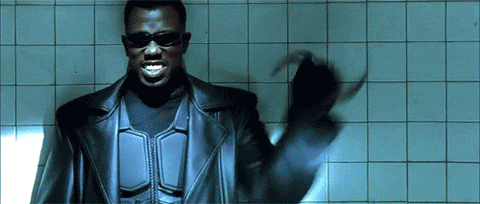
Blade is torn between his vampire and human sides. This conflict forms the core of his character and drives much of the plot across the film series. It's a compelling look at identity and belonging, themes that resonate with many viewers.
What set Blade apart in the late '90s was its groundbreaking nature: it was one of the first superhero movies to feature a black lead actor. This wasn't just a win for diversity; it revolutionized how superhero films could be made, combining elements from horror films with those from action and comic book adaptations.
Where to watch, trailers, and cast information:
- Blade (1998 - Movie)
- Blade II (2002 - Movie)
- Blade Trinity (2004 - Movie)
2. Prince Mamuwalde (William Marshall) - "Blacula" film series
In the realm of horror cinema, William Marshall broke ground as Prince Mamuwalde, marking the first portrayal of a black vampire on the big screen. His character in "Blacula" and its sequel “Scream Blacula Scream“ transcends traditional vampire lore by weaving a narrative rich with themes of love and curse that span centuries.
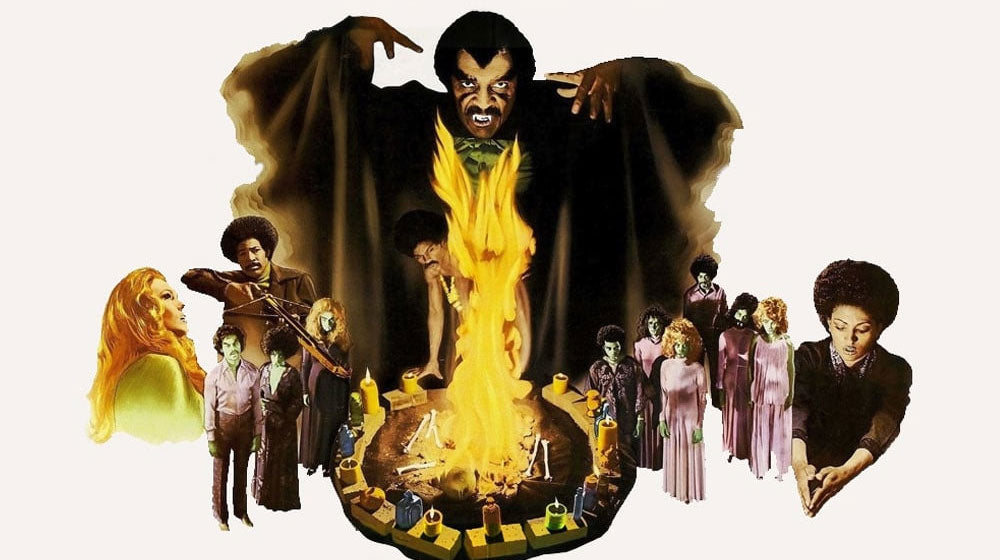
The films follow Mamuwalde, an African prince cursed to live as a vampire after seeking help from Count Dracula to suppress the slave trade. This unique premise sets "Blacula" apart from other films in the genre by introducing a protagonist who is not just battling his vampiric nature but also grappling with loss and injustice across time.
What makes "Blacula" particularly noteworthy is its blend of horror elements with social commentary. The movies delve into issues such as racism and identity while maintaining their core as engaging horror flicks. This combination has cemented them as cult classics that continue to be celebrated for their innovation and depth.
Despite being released in the early '70s, these films have left an indelible mark on how vampires are portrayed in media, paving the way for more diverse representations within the genre. They stand testament to how storytelling can evolve traditional myths to reflect contemporary concerns and narratives.
Where to watch, trailers, and cast information:
- Blacula (1972 - Movie)
- Scream Blacula Scream (1973 - Movie)
3. Akasha (Aaliyah) - "Queen of the Damned"
In her last cinematic performance, the remarkably talented Aaliyah graced the screen as the mesmerizing Akasha in "Queen of the Damned," leaving behind a legacy that continues to resonate within the community and beyond. As the Queen of Vampires, she embodied a figure that was both powerful and seductive, challenging how we typically see vampires portrayed.
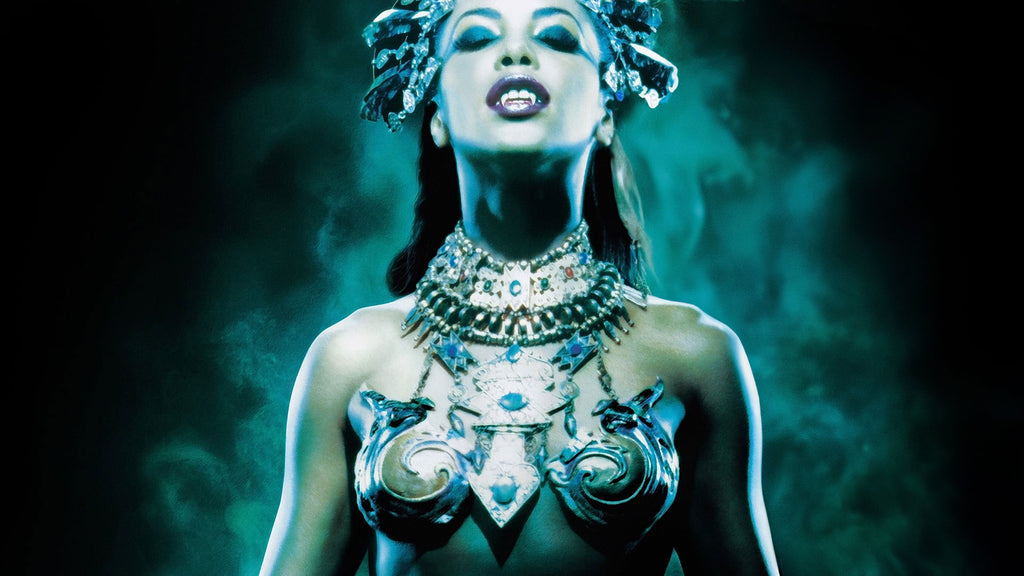
Akasha wasn't just any vampire; she was a ruler with an iron fist and a soft touch, captivating not just by her dark beauty but also by her formidable strength. This role allowed Aaliyah to explore depths far beyond what had been seen from female characters within the genre up until that point.
Her portrayal went against traditional gender roles found in vampire lore. Typically, male figures are depicted as the ultimate powerhouses while females often play secondary roles or damsels in distress. However, Akasha shattered these stereotypes by being at once fearsome and alluring without relying on a male counterpart for validation or power.
The film itself dives into themes far darker than your average vampire tale, touching on aspects such as faith versus desire and control over one's destiny versus succumbing to darkness. Through this lens, viewers are invited to reconsider what it means to wield power and face one's demons—both literally and figuratively.
More Information: Queen of the Damned on IMDB
4. Tara Thornton (Rutina Wesley) - "True Blood" TV series
Tara Thornton's journey in the "True Blood" TV series is a compelling narrative of transformation and struggle. Initially introduced as a strong-willed human with deep connections to her friends, her transition into vampirehood adds several layers to her character.
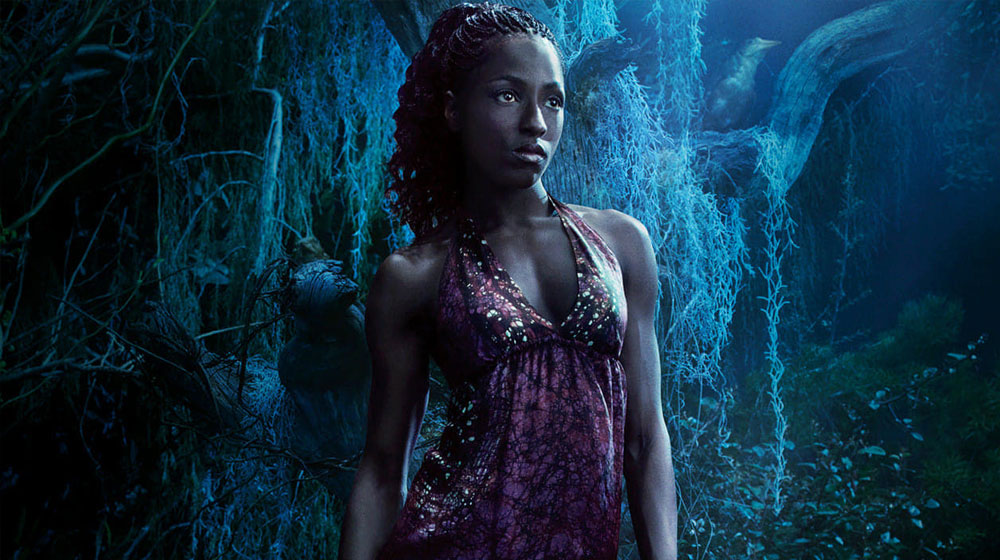
This change isn't just about acquiring supernatural abilities; it's a profound exploration of identity and loyalty within an otherworldly context. Tara grapples with maintaining her humanity while navigating the complex politics and social dynamics of vampires. Her skin tone, along with her fierce personality, sets her apart in the vampire community, highlighting diversity and strength among female characters in modern vampire stories.
Moreover, Tara represents more than just physical power; she embodies resilience against external pressures to conform or fade into the background. Her struggles resonate deeply with viewers who appreciate seeing strong female leads confront challenges head-on without losing their essence.
Her story arc also illuminates broader themes prevalent in vampire lore such as acceptance, belonging, and the eternal quest for understanding one’s true self amidst chaos. Through highs and lows, Tara remains unapologetically herself – making bold choices that underscore her independence and fortitude.
More information: True Blood on IMDB
5. Marcel Gerard (Charles Michael Davis) - "The Originals" TV series
Marcel Gerard's journey from slavery to a position of immense power in New Orleans is nothing short of remarkable. As a main character in "The Originals," his story is a testament to resilience and ambition, making him one of the most compelling black vampires on screen.
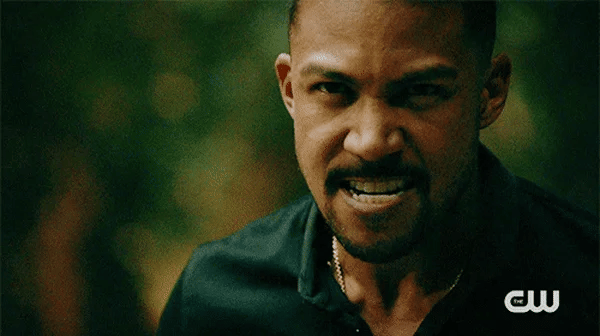
His complex relationships with family members and other characters add layers to his personality. These dynamics often explore themes of loyalty, betrayal, and the quest for power within the turbulent setting of New Orleans.
Leadership and charisma are at the core of Marcel's character. He doesn't just lead; he inspires those around him, showcasing an ability to navigate through chaos with grace and determination. His leadership style reflects both strength and empathy, drawing others to follow him despite the dangers that lurk in their supernatural world.
What sets Marcel apart is not just his powerful status but how he uses his influence. The show delves into how he balances personal desires with the needs of those he leads, highlighting moral dilemmas that resonate with viewers well beyond the realm of fantasy.
More information: The Originals on IMDB
6. Maximillian (Eddie Murphy) - "Vampire in Brooklyn"
Eddie Murphy's portrayal of Maximillian brings a unique twist to vampire lore, combining horror and comedy in ways that few films dare. In "Vampire in Brooklyn," Murphy showcases his versatility by playing a character that is both menacing and hilarious, embodying a black vampire who doesn't just lurk in the shadows but also delivers punchlines.
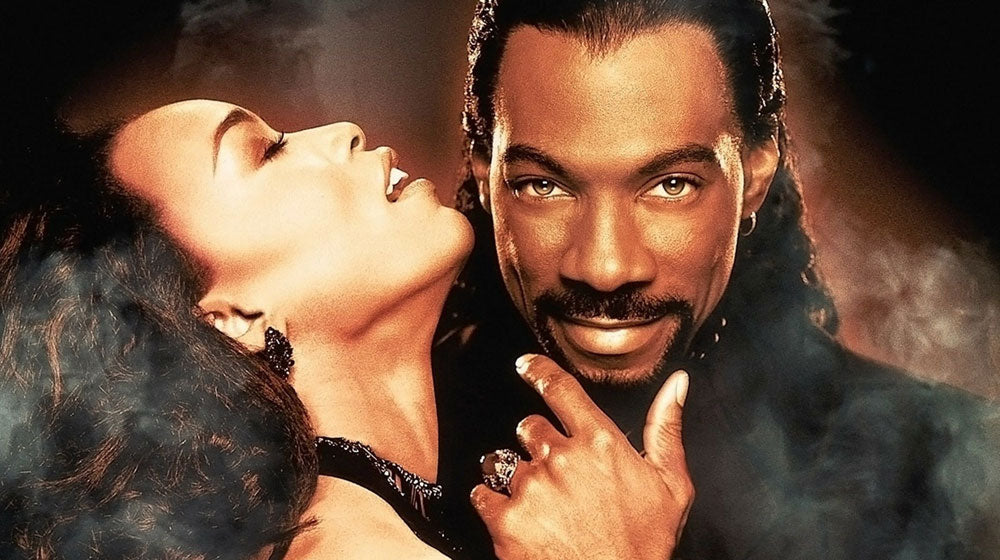
The film delves into themes of love, identity, and belonging, pushing beyond traditional vampire folklore's boundaries. Through Maximillian's journey from his cursed homeland to the bustling streets of Brooklyn, viewers are treated to a narrative that explores what it means to find one’s place in the world—a universal quest wrapped within the dark embrace of vampirism.
"Vampire in Brooklyn" stands out as a rare example where the main protagonist is a black vampire navigating through comedy and terror. This representation breaks away from typical monsters seen in horror movies, offering an alternative perspective on what it means to be powerful yet isolated because of one's nature.
Where to watch, trailer, and cast information: Vampire in Brooklyn
7. Louis de Pointe du Lac (Jacob Anderson) - "Interview With The Vampire" TV series
Jacob Anderson's portrayal of Louis de Pointe du Lac in the 2022 "Interview With The Vampire" TV series injects a fresh perspective into Anne Rice's classic character. This adaptation delves deeper into existential themes, using immortality as a lens to explore life's meaning and purpose.
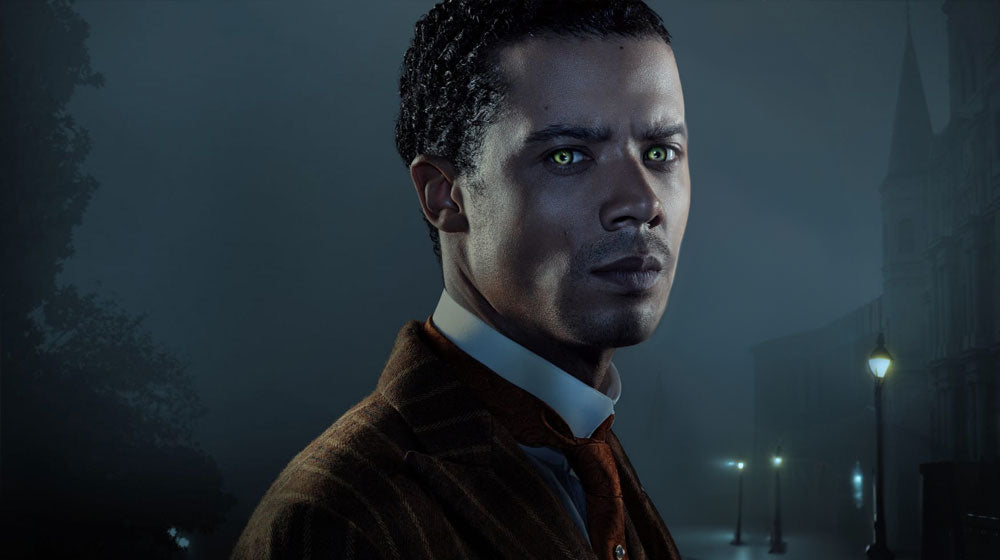
Unlike previous adaptations, this series takes a bold step by highlighting racial dynamics, an aspect that adds layers of complexity to Louis' character.
Louis' journey through immortality is not just about his struggle with his vampire nature but also reflects on broader societal issues. The show cleverly uses his undead state as a metaphor for timeless questions about identity, belonging, and change. It challenges viewers to consider how race and history influence our understanding of ourselves and others.
Moreover, this version of Louis brings out nuances in racial dynamics not deeply explored before. Set against the backdrop of early 20th-century New Orleans—a melting pot of cultures—the narrative weaves in historical injustices and their lingering effects on individuals across centuries.
Where to watch, trailer, and cast information: Interview With The Vampire
8. Lemuel Bridger (Peter Mensah) - "Midnight Texas" TV series
Lemuel Bridger stands out as a powerful, ancient vampire in the supernatural drama "Midnight Texas." Unlike traditional vampires depicted in media, Lemuel has a moral complexity that adds depth to his character. He's not just about hunting; he serves as a protector and mentor within the small, supernatural community of Midnight.
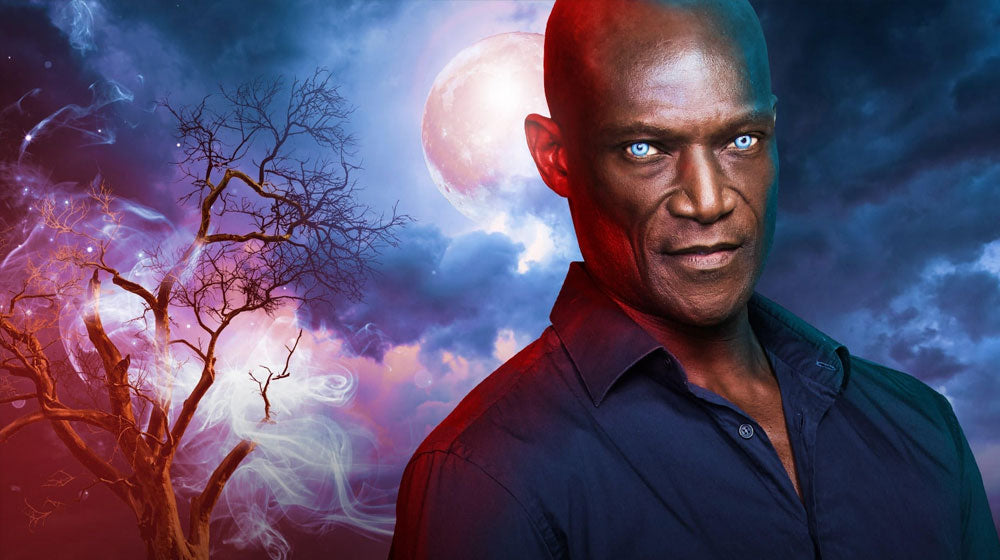
One of the most intriguing aspects of Lemuel is how his character blends African mythology with Western vampire lore. This mix creates a unique narrative that enriches the show’s universe and provides viewers with a fresh perspective on vampire tales. His abilities go beyond the typical vampiric traits, offering both wisdom and protection to those around him.
As part of Midnight's diverse group of inhabitants, Lemuel plays a crucial role in defending the town from external threats while dealing with internal conflicts among its residents. His presence brings a sense of stability and safety to an otherwise chaotic environment.
More information: Midnight Texas on IMDB
9. Amy Bellafonte (Saniyya Sidney) - "The Passage"
Amy Bellafonte, portrayed by Saniyya Sidney in "The Passage," introduces a refreshing take on the vampire genre as a child protagonist. Her innocence breathes new life into the dark and often grim world of vampirism. Unlike traditional vampire tales that focus on horror and seduction, Amy's journey is about something more profound.
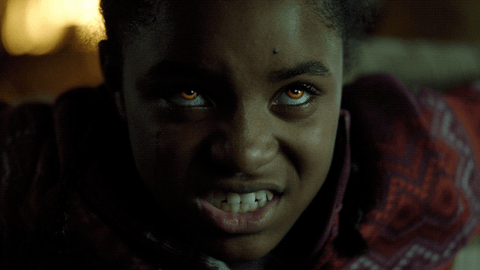
Central to her story is humanity's fight for survival against a looming vampire apocalypse. It's not just about battling vampires; it’s about what humans are willing to do to save themselves and each other. Amy stands at the heart of this struggle, showcasing her importance not only as part of the narrative but also as a beacon of hope.
The show delves deep into themes that resonate with us all: family, sacrifice, and hope amidst darkness. Through Amy’s eyes, we see the power of innocence in bringing light to bleak situations. Her relationships with other characters explore what it means to be family—not by blood but through bonds forged in adversity.
Where to watch, trailer, and cast information: The Passage
10. Dr. Mamuwalde (Katt Williams) - "The House Next Door: Meet the Blacks 2"
Katt Williams steps into the shoes of Dr. Mamuwalde, bringing a unique blend of humor and peculiarity to the role of a vampire neighbor in this horror comedy. Unlike traditional vampire portrayals, his character is far from menacing; instead, he delivers comedic relief by parodying classic vampire tropes set against an urban backdrop.
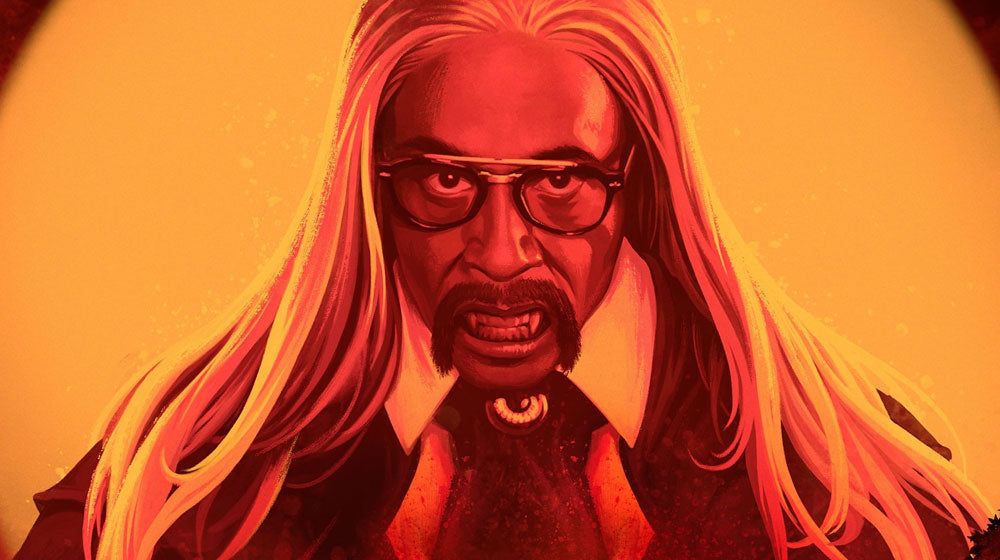
This film cleverly merges elements of horror-comedy with sharp social commentary on suburban life, making it stand out from other black vampire representations in movies and TV shows. Through Dr. Mamuwalde's interactions with his neighbors, we're treated to a humorous yet insightful look at suburban dynamics, all while poking fun at conventional vampire myths.
Williams' performance as Dr. Mamuwalde showcases how effective humor can be when used to explore societal themes within the context of horror comedy. His work in this film highlights not just the flexibility but also the potential depth that characters like vampires can offer when placed in unconventional settings.
Where to watch, trailer, and cast information: The House Next Door: Meet the Blacks 2
11. Laurent (Edi Gathegi) - "Twilight" film series
Laurent, portrayed by Edi Gathegi, stands out as a nomadic vampire who challenges the traditional coven rules depicted in the "Twilight" movies. His journey is not just about breaking away but also confronting the consequences of his past actions. This character arc brings a layer of complexity and redemption to the storyline that resonates with viewers.
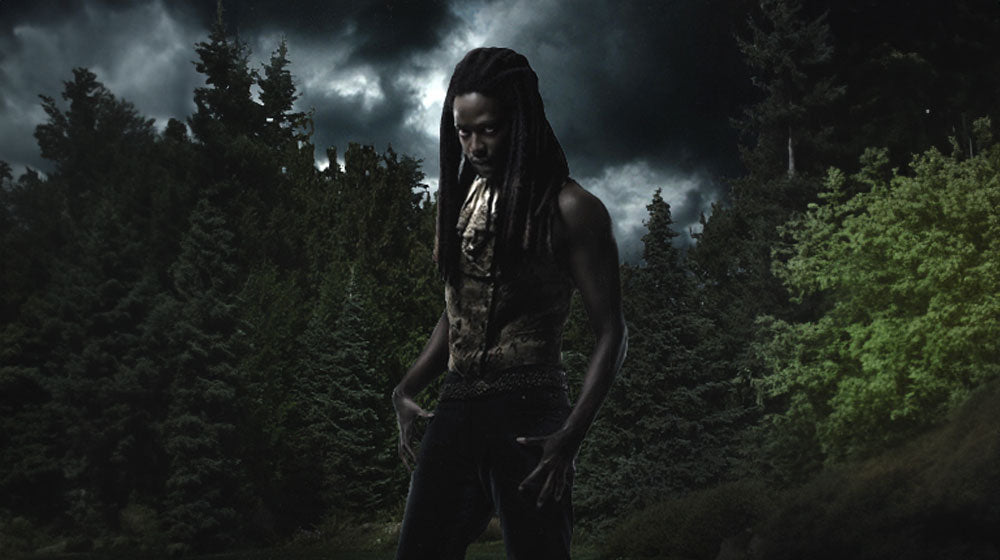
What sets Laurent apart is his role in adding diversity to the predominantly white vampire cast seen in mainstream media. His presence in the "Twilight" saga breaks monotony and introduces a fresh perspective on how vampires are represented on screen.
Despite being part of a world where sunlight is a known enemy, Laurent's unique characteristics and choices provide an intriguing contrast to typical vampire behavior observed throughout cinema history. He navigates through sunlight and shadows, embodying both literal and metaphorical meanings behind these elements.
More information: Twilight on IMDB
12. Drolta Tzuentes (Elarica Johnson) - "Castlevania: Nocturne" TV series
In "Castlevania: Nocturne," Drolta Tzuentes is a standout character, marking significant progress in the representation of black female anime characters. Her journey from a priestess of Sekhmet to a loyal servant of Erzsebet Báthory showcases a rich character development, blending themes of divine service with the allure of vampirism.
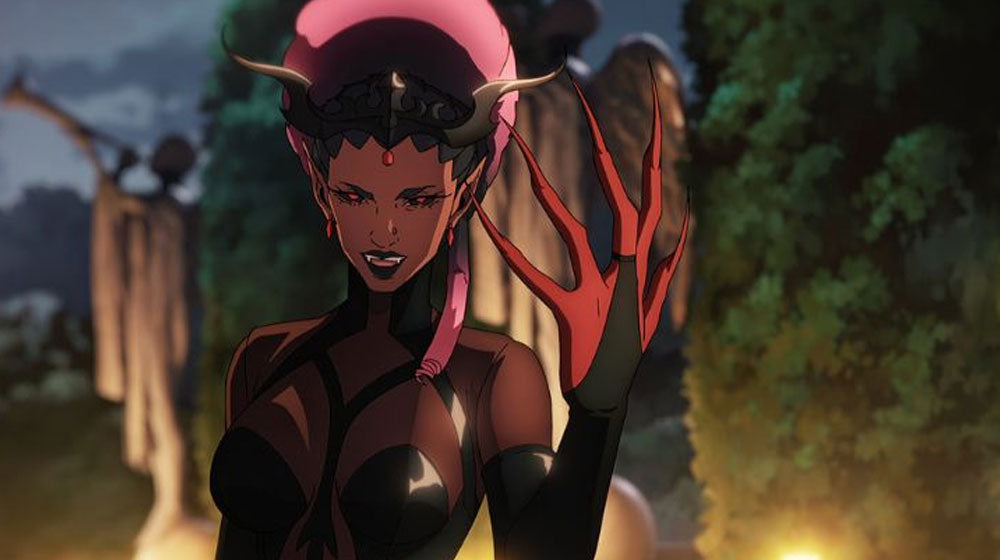
Alongside Annette, Drolta challenges traditional villain molds, offering a nuanced portrayal of strength and intellect that diverges from typical narratives.
Drolta's strategic brilliance and supernatural abilities, including her power to transform, position her as a central antagonist within the series. Her character exemplifies the show's investment in crafting complex, diverse characters whose motivations and actions drive the storyline forward. Netflix’s adaptation expands her role significantly, highlighting her as a pivotal figure in the exploration of dark themes and power dynamics.
This evolution from a background character in "Castlevania Bloodlines" to a major antagonist in "Nocturne" underscores the series' innovative approach to character development. Drolta, with her compelling backstory and motivations, captivates viewers, enriching the anime with a memorable portrayal of black female power and villainy.
More information: Castlevania: Nocturne on IMDB
13. Dr. Hess Green (Duane Jones) - "Ganja & Hess"
"Ganja & Hess" stands out in vampire cinema for its unique exploration of themes like addiction and African-American culture, with Duane Jones as Dr. Hess Green offering a sophisticated and intellectual portrayal of a black vampire, diverging from typical genre stereotypes.
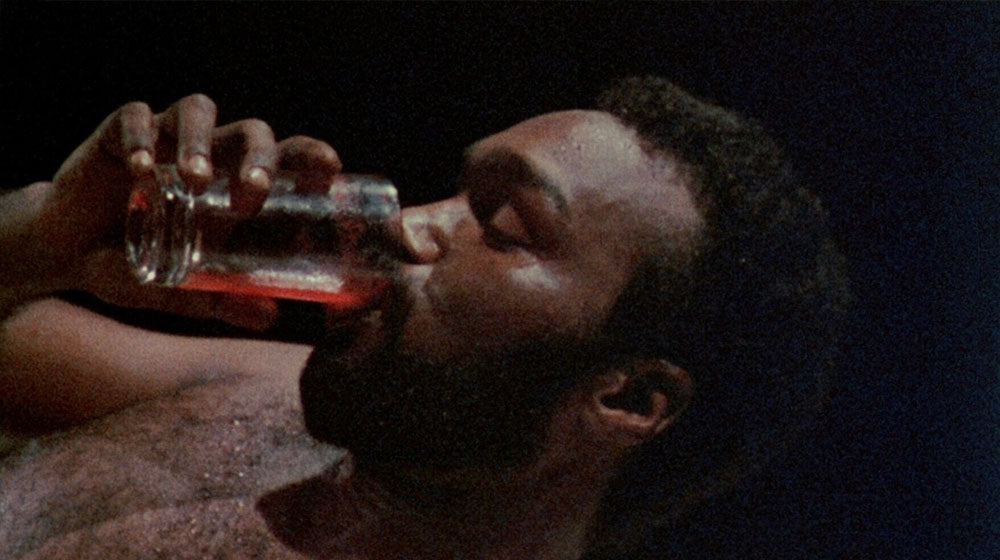
This avant-garde film is celebrated for its innovative storytelling and its nuanced approach to race and identity through the lens of an immortal being.
Spike Lee's remake, "Da Sweet Blood of Jesus," brings a contemporary twist to this classic, maintaining the original's themes while introducing modern sensibilities and Lee's distinctive style. Released in 2014, the film continues to delve into the complexities of race, addiction, and class, paying homage to the groundbreaking original while contributing new perspectives to the conversation on black representation in horror cinema.
Both films are significant for their insightful commentary on cultural identity and societal norms, enriching the genre with their profound narratives.
Where to watch, trailers, and cast information:
14. Temptress (Cynthia Bond)- "Def by Temptation"
In "Def by Temptation," Cynthia Bond brings to life a captivating character known as the Temptress. She's not your typical villain; instead, she embodies a seductive entity that preys on men’s desires, blending horror with an erotic thriller vibe—all from an African-American perspective.
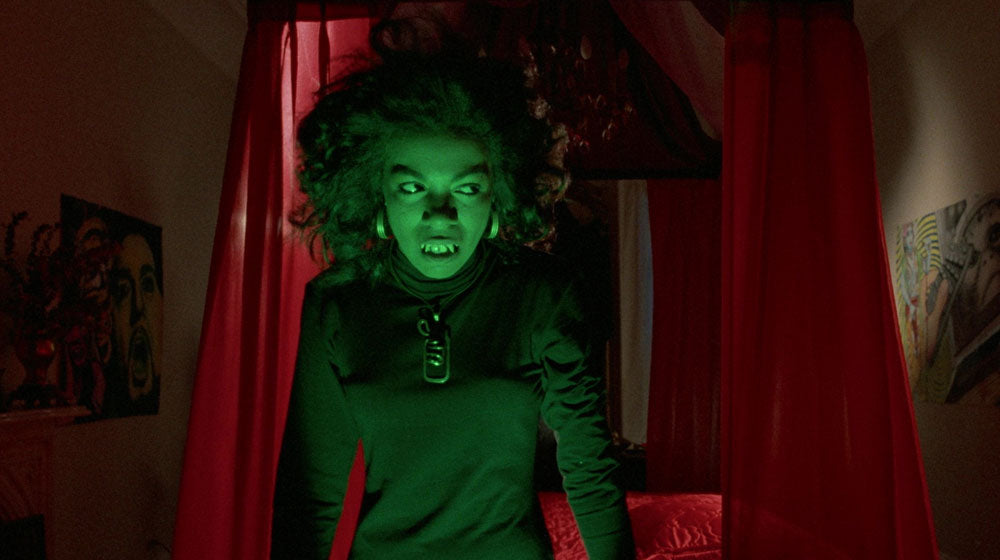
The film is unique in how it mixes genres and themes. It dives deep into issues of temptation, morality, and faith, all set against the backdrop of urban settings. This blend makes for a compelling narrative that stands out in the realm of black vampire movies and TV shows.
- The Temptress uses her power to manipulate her victims.
- Her transfiguration abilities allow her to appear irresistible.
- Pride becomes both her weapon and downfall as she navigates through the city's nightlife.
What sets this character apart is not just her supernatural allure but also the deeper messages woven into her story. Through encounters with various characters, viewers are prompted to reflect on their own values and decisions when faced with temptations.
Where to watch, trailer, and cast information: Def by Temptation
15. Katrina (Grace Jones) - "Vamp"
Grace Jones takes on the role of Katrina, a vampire queen, in "Vamp," delivering an unforgettable performance that stands out even among vampires in film and TV. Her portrayal combines horror with campy humor, all set against the backdrop of a vibrant 80s nightclub scene.
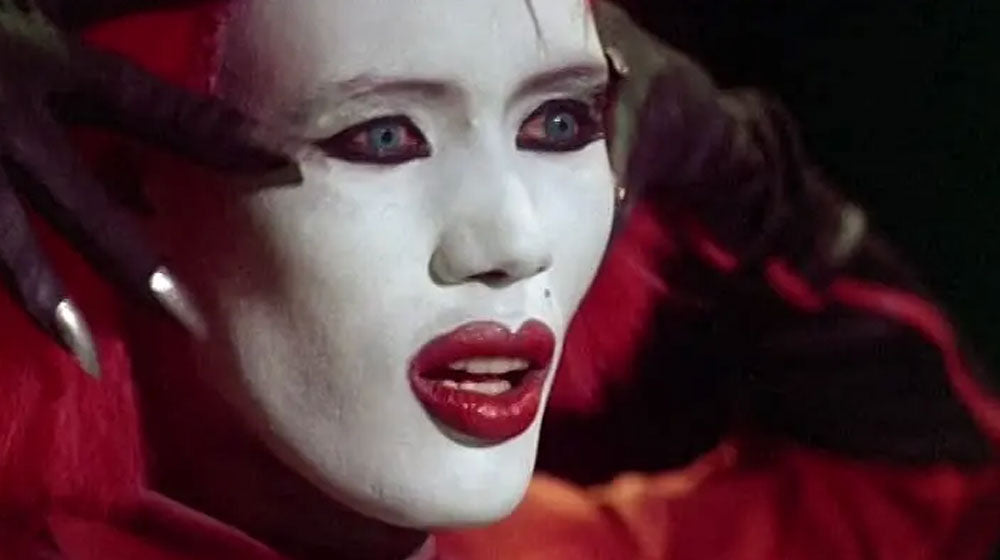
Jones' character is iconic not just for her unique visual style but also for how she embodies vampirism. With an otherworldly presence, she captures the essence of what it means to be a powerful and enigmatic vampire. This role showcases Grace Jones at her best—mixing strength, mystery, and allure.
"Vamp" itself is a cult classic for many reasons:
- The blend of horror and comedy provides an entertaining watch.
- Its setting offers a nostalgic trip to the 80s club scene.
- Grace Jones’ performance as Katrina brings something truly special to the vampire genre.
This movie goes beyond traditional vampire tales by injecting humor into darkness and presenting vampirism through a lens that is both visually stunning and narratively engaging. Fans love it for its uniqueness, often citing Katrina's blood pack scenes and her unconventional love story as highlights.
More information: Vamp on IMDB
Summary
Diving into the world of black vampires in movies and TV shows offers a thrilling adventure beyond the typical fangs and capes narrative. You've seen how characters like Blade and Akasha redefine what it means to be a creature of the night, blending horror with heroism, and tragedy with triumph. These stories not only entertain but also challenge stereotypes, showcasing diversity and depth in a genre often criticized for its lack of both. So, why not sink your teeth into more than just the mainstream vampire tales? Explore these multifaceted narratives that bring something unique to the table—whether it's a dose of humor, a touch of class, or a fight for justice. Your next favorite character might just be among them.
Looking to explore something new? Dive into our guide on vampires in African mythology. It's packed with stories from the Motherland about unique, bloodthirsty creatures.
Frequently Asked Questions
Who was the first black vampire in movies?
Prince Mamuwalde, portrayed by William Marshall in "Blacula" (1972), is recognized as one of the first black vampires featured in cinema. This groundbreaking film introduced a new layer to the vampire genre.
Can you name a female black vampire from movies or TV shows?
Yes! Akasha, played by Aaliyah in "Queen of the Damned" (2002), stands out as a powerful and iconic female black vampire. She's not just any vampire; she's considered the queen among them.
Is there a comedic take on black vampires in film?
Absolutely! Eddie Murphy takes on this role brilliantly as Maximillian in "Vampire in Brooklyn" (1995). It’s like your typical Brooklyn night out but with fangs and Eddie Murphy’s unmissable humor.
Are there any recent TV shows featuring black vampires?
Indeed! One recent show is “Interview With The Vampire” (2022) where Jacob Anderson plays Louis de Pointe du Lac, giving us a fresh perspective on this classic tale with his compelling performance.
Who plays Marcel Gerard in "The Originals" TV series?
Charles Michael Davis brings Marcel Gerard to life with charm and intensity. He’s like that friend who always has your back, only he might also have fangs.
What makes Blade a unique character among black vampires?
Blade, portrayed by Wesley Snipes across three films starting from 1998, uniquely combines human and vampire strengths without succumbing to vampiric weaknesses. Think of him as the ultimate hybrid superhero – half man, half vampire, all action.
Has there been an adaptation of Blade for television?
While Blade primarily shines through film series starring Wesley Snipes and an announced upcoming Marvel’s Blade project, it did inspire a short-lived TV series titled “Blade: The Series” aired in 2006 with Sticky Fingaz taking on the titular role.
About the Author
Gil Santos
With over 20 years of experience in various narrative mediums, Gil Santos is the singular mind behind Culture Bay. His journey began as a lyricist and web developer, later expanding into crafting dynamic conference presentations and engaging YouTube sketches. This diverse background has allowed him to hone his storytelling skills across different fields. Santos' lifelong passion for sci-fi and fantasy, combined with his knack for interactive storytelling, culminate in Culture Bay - a fusion of innovative ideas and engaging narratives intended for all to enjoy.
